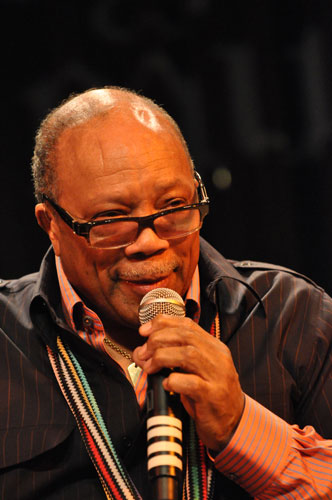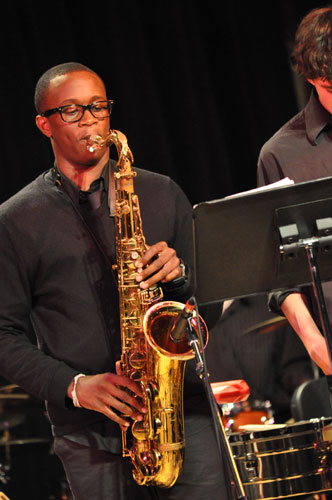Quincy Jones: Forget the Hype

Quincy Jones '51 visits Berklee and watches a City Music All-Stars performance, offering praise and constructive criticism.
Photo by Phil Farnsworth

From left: Christiana McMullen, a Boston Arts Academy student, with Berklee students Jessica Johnson (a Boston Latin Academy graduate) and Jalysa Riley (a Boston Arts Academy graduate)
Photo by Phil Farnsworth

Gregory Groove Jr., a student at Boston Arts Academy
Photo by Phil Farnsworth

Lauren Fuller and Joseph Santiago, who will attend Berklee this fall, with professor Winston Maccow, director of the City Music All-Stars
Photo by Phil Farnsworth

Quincy Jones gives his critique of a performance as Berklee president Roger H. Brown looks on.
Photo by Phil Farnsworth

Tarrell James of Chelsea High School listens to Jones's advice.
Photo by Phil Farnsworth

Christiana McMullen
Photo by Phil Farnsworth

Matthew Hull of Boston Latin School
Photo by Phil Farnsworth
City Music students and alumni knew they were in the presence of an industry stalwart when multi-Grammy Award–winner Quincy Jones '51 came to Berklee. They listened with rapt attention as the legendary producer—whose credits include Michael Jackson's Thriller, the best-selling album of all time—praised and critiqued their performances and offered insight into the ever-changing music world. Jones—whose many hats include composer, instrumentalist, conductor, and record company executive—was in town to receive an honorary doctorate at New England Conservatory when he paid a visit to his alma mater, and specifically requested to work with City Music students. The Berklee City Music program provides Berklee resources, facilities, and scholarships to underserved 4th- through 12th-graders.
The City Music All-Stars performed a range of material, from Anita Baker's "Caught Up in the Rapture" to Wayne Shorter's "Fall" to Michael Jackson's "The Way You Make Me Feel" (for which Jackson and Jones shared producing credits), featuring All-Stars director/assistant professor Winston Maccow.
Jones was clearly impressed with the musicians' prowess, noting "There's not much to criticize" after their first number. He continued to praise the vocalists and instrumentalists—a mix of high school and Berklee students—and provide constructive criticism where there was room for improvement.
The following are excerpts from Jones's sage advice.
On keeping your head straight among all the hype:
I know what you're up against. You've got yo yo yo, and bling bling. . . forget all that stuff and just be a great musician. You can take it anywhere you want. I'm hearing influences that I heard in that recording session in 1959 [for Miles Davis's Kind of Blue]. It's beautiful to see. It helps me to relive my youth. Stay on the track. It's 20 times harder today to stay on the path.
On the importance of staying in the pocket:
The pocket is the most important thing because that's what drives everything else. It's really important to lock that pocket so it's not floating around. . . dance when you can but get in the pocket. Look at each other.
On advice jazz tenor saxophone player Ben Webster shared with him when he was 19:
Everywhere you go in the world, eat the food that people eat (real people), listen to the music, listen to the language. It will change your life. Learn 40 words in every language. You can't get an A if you're afraid of an F so take a lot of chances.
On the road to success:
Approach your calling and creativity with humility. Approach your art with humility. And treat your grace with sass. . . . If you think you deserve the success, you're wrong. If you think you don't deserve it and you're just BSing everyone, you're wrong, too. . . . You can't use it, touch it, taste it, see it, or smell it. But Lord knows you can feel it.
I've never, ever gone into a studio talking about how many records we can sell, how much money we can make. You can have the coolest record in the history of the world, but if anybody says they know how to sell X amount of albums they're lying. Just do something you love and you might get lucky. There's no science to it. If you're making something somebody else wants and you don't like it, you're in big trouble.
On improving as a vocalist:
Get 10 of your favorite singers and put them on one CD. Play it over and over again and copy every note. You might as well walk in the shoes of giants.
